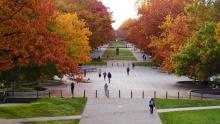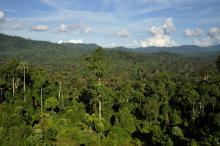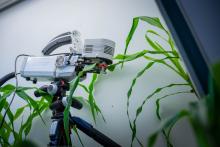A blue whale skeleton preserved under the soil of Prince Edward Island for 20 years begins a cross-Canada journey this weekend, when a team of UBC scientists exhumes its remains.
The massive 25-metre skeleton, once unearthed and properly prepared, will become the centrepiece exhibit of UBC’s new Beaty Biodiversity Museum.
"As with any exploration, there is a mixture of excitement and anxiety," says Andrew Trites, a researcher at the UBC Biodiversity Research Centre who is leading the exhumation and preparation of the skeleton.
The magnificent female blue whale beached on the coast of the province in 1987, and was buried to preserve its remains until a suitable home could be found for it. Over the next year, Trites’ team will clean, transport, prepare and install the impressive specimen in the museum—bringing Canada's first blue whale skeleton to British Columbia.
There are only four other blue whale skeletons on display in North America. In addition to the blue whale skeleton, the Beaty Biodiversity Museum will also feature more than two million specimens of mammals, fish, shells, fossils, insects, birds and plants.
Veterinary students and pathologists from the University of PEI will join the UBC team to uncover and prepare the skeleton for transport by rail to Victoria, BC, where it will be readied for display. Students from PEI's Holland College will also visit the site as part of a wildlife conservation course.
Musqueam First Nation land acknowledegement
We honour xwməθkwəy̓ əm (Musqueam) on whose ancestral, unceded territory UBC Vancouver is situated. UBC Science is committed to building meaningful relationships with Indigenous peoples so we can advance Reconciliation and ensure traditional ways of knowing enrich our teaching and research.
Learn more: Musqueam First Nation
Faculty of Science
Office of the Dean, Earth Sciences Building2178–2207 Main Mall
Vancouver, BC Canada
V6T 1Z4


